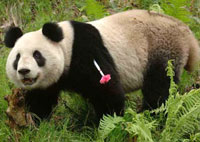|
 |
|
Panda Xiang Xiang, a
tranquiliser dart still hanging from his shoulder, is released from
the Wolong Giant Panda Protection and Research Center in southwest
China's Sichuan province April 27, 2006. The four-year-old male
giant panda, which was raised at the centre, was the first to be
released out of more than 180 captive-bred pandas worldwide, China
Daily reported. [Newsphoto] |
He became the first-ever human-raised giant panda to be released into
the wild, and had to undergo three years of survival training. He will be
monitored through a global positioning
device attached to a collar.
Facing his new world, the panda hesitated for a second on Friday then
wandered into bamboo groves 10 metres away.
Born into the China Giant Panda Protection and Research Centre in
Wolong in 2001, Xiang Xiang was selected from more than 100 giant pandas
bred in captivity for natural
habitat training, mostly because he was strong and healthy, said experts.
He learned how to build a den, forage for food and mark his territory, and
developed defensive skills by howling and biting, said Zhang Hemin, head
of the panda research centre.
Zhang said they chose to release Xiang Xiang now because in late April
his favourite food, bamboo shoots, are sprouting.
Xiang Xiang faces many challenges, one of which is parasitic infection, said Zhou Xiaoping,
deputy chief engineer at the centre.
"Parasites can be fatal for a giant panda," Zhou said. "The bamboo
shoots they eat in captivity are disinfected and scientists regularly
check pandas for parasites."
There are more than 180 giant pandas living in captivity, and 1,590 in
the wild, mostly in Sichuan.
Xiang Xiang's liberation marks a significant change in saving the
endangered species, with the move to training them to live in the wild,
said Zhao Xuemin, deputy head of the State Forestry Administration.
Chinese scientists had previously given priority to artificial-breeding
and protection, Zhao said.
Plans are afoot to release other endangered species into the wild such
as Chinese alligators, wild
horses and red ibis (a kind of
bird).
(China Daily)
|